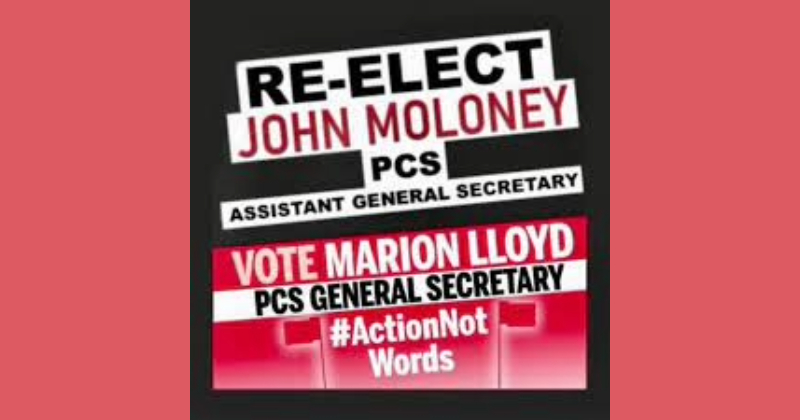

By PCS activists
Members of the civil servants’ union PCS will vote to elect their general secretary and assistant general secretary in November. The contest is between the ruling Left Unity faction candidates Fran Heathcote for general secretary and Paul O’Conner for assistant general secretary, and Marion Lloyd (Socialist Party) and incumbent AGS John Moloney (Workers’ Liberty), respectively from the Broad Left Network and Independent Left factions.
Outgoing general secretary Mark Serwotka has been in post since 2000, a period in which the National Executive Committee was dominated by Left Unity. It was this leadership which oversaw the disastrous civil service pay campaign, the consequences of which will rightly dominate the election for the new leadership.
Pay sellout
Strike ballots in November 2022 and May 2023 secured record turnouts, with the majority of departments achieving the 50% threshold. The momentum was immediately stalled with members waiting nearly three months for the first national action on 1 February. After that there were just two further strikes on 15 March and 28 April. Despite a majority voting in May 2023 to take further action and annual conference delegates endorsing a strategy of national and targeted action, the union’s leadership suspended the strikes in June.
PCS Says No was launched to rescue the pay campaign. While activists forced the NEC to allow members to decide whether to continue the strike, the question was posed in a way aptly described by Independent Left as Orwellian: when asked if they supported continuing the campaign, voting yes meant suspending action, and no meant continuing it. As a result of this bureaucratic deception, the leadership secured a ‘mandate’ to abandon the campaign.
The PCS campaign was for a consolidated 10% pay rise, backdated to 2022. What the leadership delivered was 2% for 2022/3 and 4.5-5% for 2023/4, and an unconsolidated £1,500 lump sum, paid pro-rata to part timers.
Unions that fought harder got as much as 6.5% which, while still far below inflation, proved much more could have been won. That the senior civil service was awarded a higher pay rise than the junior grades was an extra slap in the face.
Vote and organise
Despite the leadership’s control of the union machinery, and advance planning for the unscheduled elections, branch nominations show members are in no mood for a coronation.
Heathcote and O’Conner received 90 and 84 nominations, and Lloyd and Moloney 80 and 87 respectively.
Many activists on the left of the union are reluctant to support Marion Lloyd, who was a loyal member of Left Unity and supporter of its industrial strategy until a bureaucratic squabble in 2019 led to the SP walking out and founding its own Broad Left.
This reticence to replace the current bankrupt broad left with, essentially, another broad left is understandable. But the essence of these elections is a struggle between the architects and supporters of the pay dispute sell-out, and those who opposed them. For that reason, notwithstanding our irreconcilable political differences with both candidates, Workers Power encourages PCS activists to vote for Lloyd and Moloney.
Whatever the outcome, success in future struggles will depend on members organising to take control of strikes and negotiations, and ensuring real democracy by ensuring all officials are subject to election and recall and paid the average wage of a PCS member.
Socialist Appeal: Left cover for Left Unity
Left Unity was formed in the early 2000s to secure ‘left leadership’ of the union, which it did for two decades. The Socialist Party dominated the NEC, and supported a litany of defeats to maintain the alliance and keep their posts. Eventually an apolitical falling out with Serwotka led them to leave one broad left and form another, narrower, Broad Left Network.
The PCS leadership’s strategy of targeted action and occasional protest strikes failed miserably, as we warned it would. Despite winning earlier NEC elections (before the sellout), the leadership faction has been damaged by wide-spread resignations of reps and activists, including, belatedly, the SWP.
But Left Unity can still depend on the services of the union’s self-described ‘Marxist tendency’, Socialist Appeal. Like their erstwhile comrades in the Socialist Party before them, SA have boldly junked Trotskyism for Broad Leftism. In July, with the leadership campaigning to have the pay campaign called off, they provided a helpful alibi, sagely noting that ‘it is sometimes necessary in battle to retreat in good order, after a partial victory, rather than risk a rout by pressing forward with tired troops.’
No doubt in confident anticipation of future rewards for services rendered, these ‘revolutionaries’ don’t hesitate to blame the troops for the incompetence and cowardice of their generals! Worker militants won’t forget this shameless left cover for the leadership’s sabotage.
Behind the radical rhetoric and foam-flecked denunciations of ‘sectarians’, Socialist Appeal differ from the SP only in the degree of their devotion to the Broad Left fetish which has proven time and again a fatal obstacle to workers’ struggles.